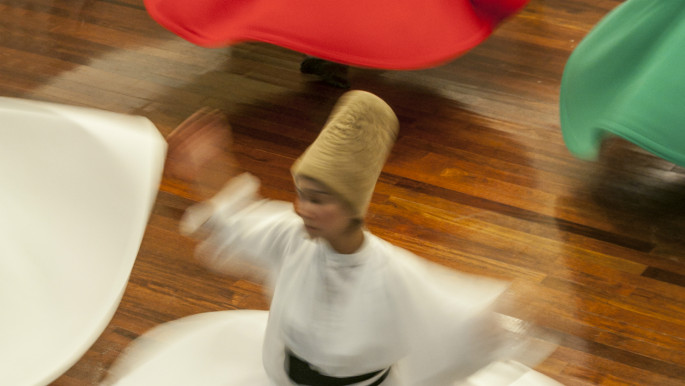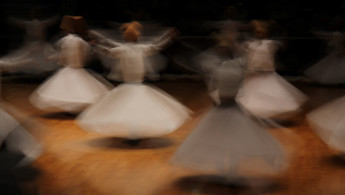The female whirling dervishes reclaiming Afghanistan’s Sufi heritage
A female-led whirling dervish group based in Afghanistan, is reclaiming the country's deep-rooted Sufi heritage.
Sufism is the mystical form of the Islamic religion, and focuses on an inward connection with God.
Fahima Mirzaie, a 24-year-old student, founded the Kabul-based Sufi dance and performing arts group, which has strong female leads as well as members who are both male and female.
The group is called Shohod Arefan and means 'The Intuition of Mystics'. Fahima teaches the group the technique of the ritual. Some of her students are as young as six-years-old.
The concept of a female Sufi dance group may sound strange to a Western audience, but the connection between women and Sufi mysticism has a long history leading back to the early days of Islam.
The first known female Sufi was a woman called Rabi'ah al-Adaviyah who lived in the 8th century, and was born in Basra, Iraq. There were many other women both well-known and of lesser prominence throughout history.
Fahima is teaching the sema (ceremony in remembrance of God through music and dance) and the whirling dervish ritual, which takes time and patience to master.
 |
|
| Read also: Travelling Palestinian feminine mysticism in the Sufi corners of Nablus |
The tradition of the whirling dervish ceremony is said to have originated from the 13th century philosopher and poet, Jalaluddin Rumi who was born in Afghanistan. He founded the 'Mevlevi' Sufi order who are the proponents of this beautiful synchronised spiritual dance.
The ritual is well loved for its beauty and mystical qualities; and the practice has travelled far and wide, even gaining popularity with western audiences.
Rumi, as well as other Mevlevi leaders had female disciples. Women were part of Sufi spiritual ceremonies, where sometimes men and women performed side by side.
The orthodox and literal interpretation of religion in Afghanistan is actually a more recent phenomenon. The Taliban suppressed the practice of Sufism, though it now seems to be making a comeback since the Taliban's downfall.
 |
The tradition of the whirling dervish ceremony is said to have originated from the 13th century philosopher and poet, Jalaluddin Rumi who was born in Afghanistan |  |
Sufism has a long-standing tradition in Afghanistan. As well as the influence of Rumi, the Naqshbandi, Qadriyya and Chishti Orders have featured prominently in the country's history.
Afghanistan has been home to many Sufi saints and their shrines. Devotional songs and dance were commonplace here, and their revival has given the Afghan people a route of emotional release, and a way to unburden their souls from the problems of the world.
Afghanistan also has a history of strong women, and females like Fahima are certainly doing their part in connecting the people to their forgotten past.
"I became interested in the sema, from when I was 12-years-old," Fahima told The New Arab. "I tried to learn more as it fascinated me. I am now one of the first female performing dervishes in Afghanistan."
 |
|
 |
|
This seems a risky move from Fahima, especially when there is still instability in the country, but she is committed to her passion. Things seem to be changing in Afghanistan, albeit slowly.
Once a huge part of Afghani life, the Sufi practices have clearly not died out from the hearts of the people, and the revival is gaining huge popularity.
"It is a way for people to connect with spirituality and find inner peace in a war-torn country," Fahima adds.
Shohod Arefan rehearse in school halls in the neighbourhood, and put on performances for religious and cultural celebrations such as the birthday of Rumi. They use live music played with traditional instruments, which helps create that perfect spiritual environment and connection.
 |
Devotional songs and dance were commonplace here, and their revival has given the Afghan people a route of emotional release, and a way to unburden their souls from the problems of the world |  |
Sufis believe that nature is music, and the sounds they use in their spiritual remembrance resemble these natural soothing sounds, which are designed to penetrate the heart.
It is heart-warming to see women like Fahima playing a big part in restoring the Sufi tradition of sema and spiritual dance in this corner of Afghanistan. Women in traditional societies play significant roles, although not always gaining the recognition they deserve.
Females have been the key to passing on tradition, often through teaching their children or community. Sufi tradition is also passed on in a similar way, from teacher to student. Therefore, it is befitting to see a woman take a leading role in reclaiming the country's Sufi past.
Nadia Khan is a historian and writer. She is the founder of Golden Threads: A project exploring shared history, culture and art across the Islamic world and beyond.
Follow her on Instagram @goldenthr3ads



